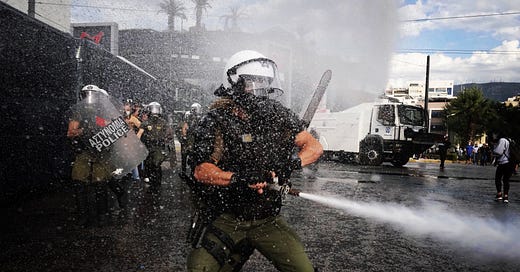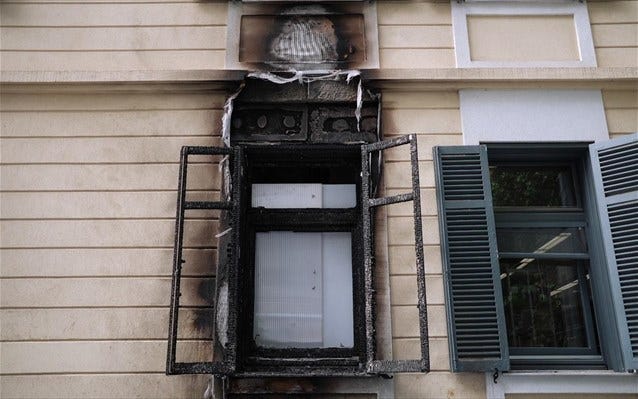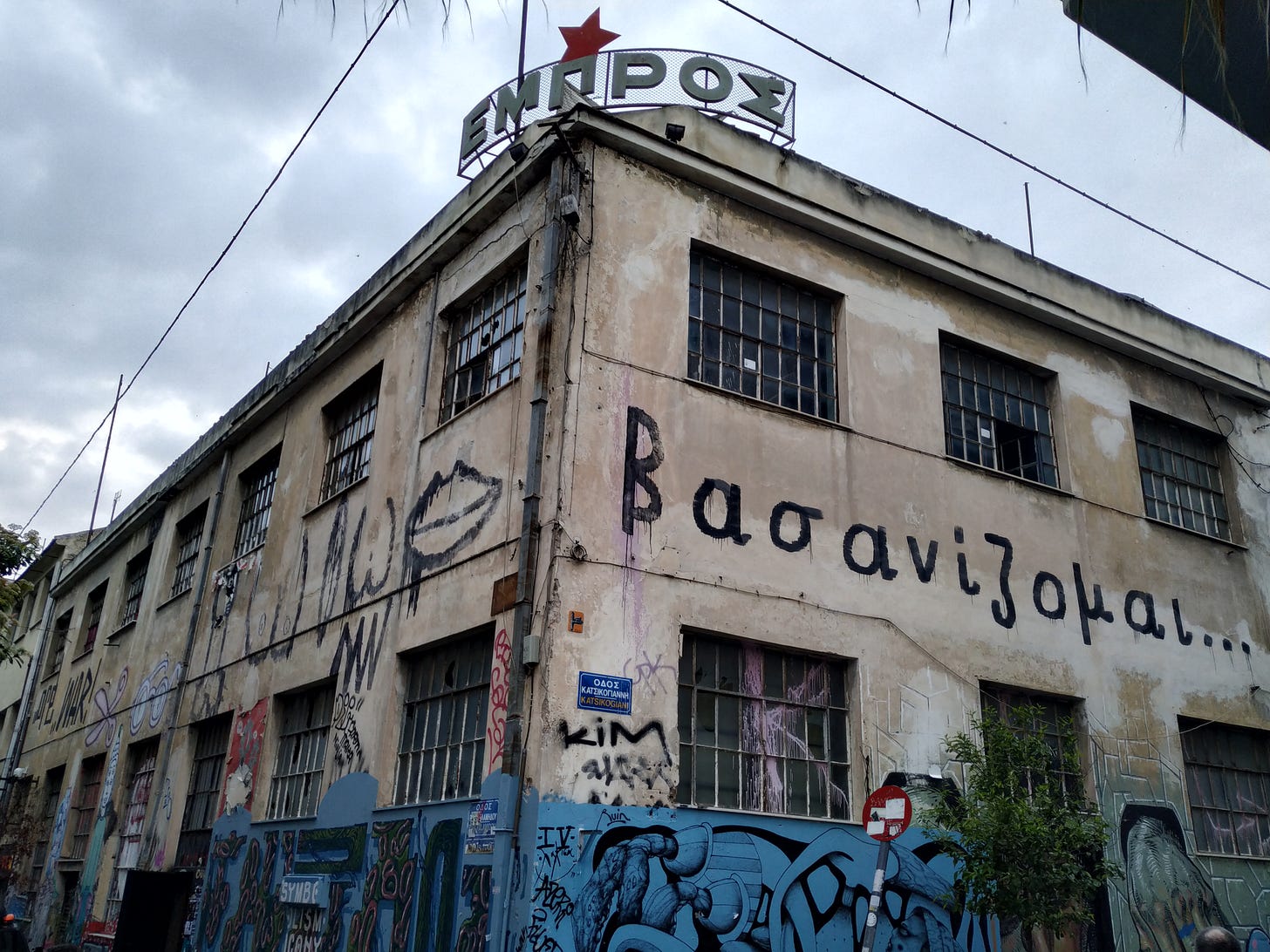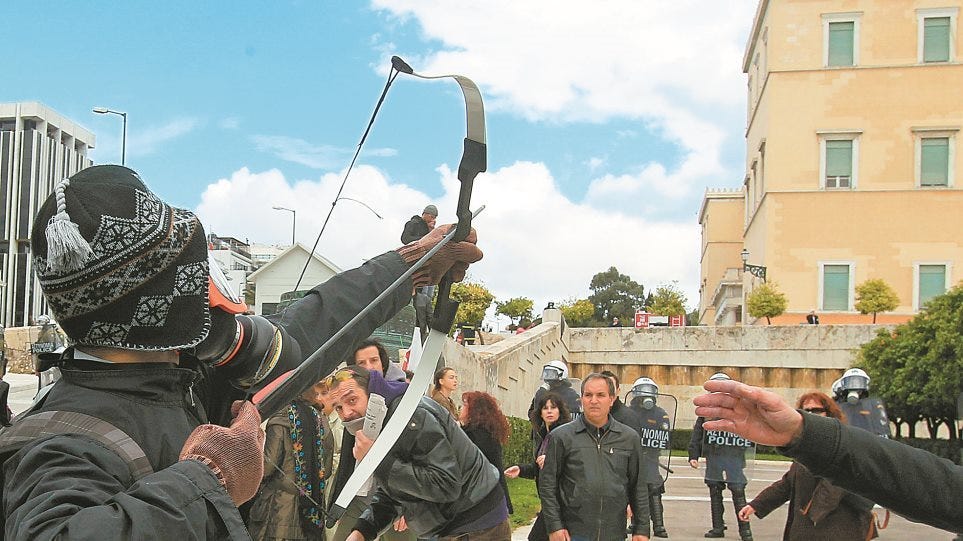30 May, 2021: News Roundup
A weekly news roundup of events posted by The WannabeWonk on Twitter dot com
(May News Roundup: Greek police deploy water cannons, pepper spray and crowd control munitions against pro-Palestinian demonstrators outside of the Israeli Consulate in Athens; former MEP and convicted member of the neo-Nazi party, Golden Dawn, is extradited to Athens from Brussels and is now serving his prison sentence; unknown individuals detonate a gas canister bomb outside of the Goethe Institute in Thessaloniki, May 17; communique claiming 20 attacks across Greece since January calls for a new “network of revolutionary violence”: the Nuclei of Immediate Action/Direct Action Cells (NIA/DAC); a police chief on Crete is pulled over while driving with 42.5 kilograms of gelatin dynamite in the trunk of his wife’s car; the self-managed cultural center within Embros Theater in Athens was evicted and sealed by police, and has since been re-occupied; Greek anarchist and former member of CCF, Yannis Michailidis [aka “The Syntagma Archer”], releases a communique ahead of his May 31 court date.)
Hellenic Police Deploy Water Cannon, Crowd Control Munitions to Disperse Protests in Front of Israeli Consulate in Athens (Greece)
Greece has seen large protests against the Israeli bombardment of Gaza and in solidarity with Palestinians. On Wednesday May 12th, police dispersed hundreds of pro-Palestinian protesters in front of the Israeli Consulate in Athens using tear gas. That Friday several demonstrations took place in Greece, and hundreds of students and members of communist organizations (mostly Trotskyist and Marxist-Leninist) marched through the streets of Thessaloniki in solidarity with Palestine. On Saturday May 15th, as hundreds of Greeks and refugees protested in front of the Israeli Consulate in Athens once again, the riot unit of the Hellenic Police (“the MAT”) deployed water cannon, pepper spray, tear gas and crowd control munitions against the demonstrators. Clashes between protesters and police ensued, but police eventually dispersed the crowd.
Bilateral relations between Greece and Palestine via the PLO have historically been very good, with Greece being one of the more outspoken advocates for the Palestinian people within the European Union and traditionally supporting the Palestinian cause above recognition of Israel. However, the current Greek administration under Prime Minister Kyriakos Mitsotakis has made extensive diplomatic efforts to strengthen strategic relations between Greece and Israel, seeing Israel as an important regional partner in their ongoing rivalry with neighboring Turkey in the Aegean and Eastern Mediterranean Seas. Increasing Turkish influence within Gaza has worried Athens that the government of Recep Tayyip Erdogan will seek to establish a maritime boundary deal with authorities in Gaza similar to Turkey’s contested agreement with the UN-recognized government in Libya. Greek foreign minister, Nikos Dendias, rushed off to both Jerusalem and Ramallah last week, where he met with his Israeli and Palestinian counterparts. In addition to Greece’s own budding strategic relationship with Israel—the two countries have conducted multiple military exercises together and have a status of forces agreement—energy cooperation in the form of hydrocarbon exploration between Israel and Cyprus has further strengthened ties between Israel and Greece. Perhaps of historical significance to PM Mitsotakis, and at a policy level, is the fact that Israel was formally recognized in 1990 by his father, then-Prime Minister Konstantinos Mitsotakis.
Regardless of the friendly relations maintained between the government in Athens and Palestinian authorities in the West Bank, last week’s crackdown on protests in front of the Israeli Consulate is a clear sign of the new geopolitical reality and the foreign policy of Greece’s ruling New Democracy (ND) party.
Greek neo-Nazi and former Member of European Parliament, Yannis Lagos, Extradited to Athens
Member of European Parliament and convicted neo-Nazi, Yannis Lagos, has been extradited to Athens from Brussels. He briefly went before a judge before being taken to Hellenic Police headquarters, then transferred to Domokos Prison in Central Greece where he will serve his thirteen-year sentence. A founding member of the neo-Nazi political party-cum-militia, Golden Dawn, Yannis Lagos was the second-in-command below the party’s leader and creator, Nikolaos Michaloliakos. Lagos was personally convicted of orchestrating the deadly gang assault on anti-fascist rapper, Pavlos Fyssas, which resulted in the fatal stabbing of the latter by Lagos’ fellow member of Golden Dawn, Giorgos Roupakias. Fyssas had been watching a soccer match on a café patio among friends in an Athens suburb when a group of Golden Dawn members armed with bats and knives attacked him. He was the specific target of the attack.
May 17 Gas Canister Bomb Targets the Goethe Institute in Thessaloniki (Greece)
Unknown individuals successfully detonated another improvised explosive device (IED) fashioned from a gas canister in Thessaloniki, this one targeting the Goethe Institute—Germany’s international cultural-institute. Though no one was injured in the attack, the blast and resulting fire caused damage to the outside of the building and to a nearby parked car. The IED apparently had been placed in a bucket on the side of the Institute. Neighbors who heard the blast then attempted to put out the fire burning along the side of the building, until emergency crews arrived.
I have not yet seen a claim for the attack, but there is a high probability that the individuals who do claim it will be from one of the smaller units belonging to the newly formed revolutionary underground network, the Direct Action Cells/Nuclei of Direct Action (DAC/NDA). The formation of DAC as a “network of revolutionary violence” was announced earlier this month in a communique that claimed twenty attacks on the Greek state and private property all in the network’s name. Over half of those attacks took place in and around Thessaloniki, and all employed either the use of Molotov cocktails or gas canister IEDs. In one of their more high-profile attacks, DAC detonated an IED outside of military residences near the NATO base in Evzoni, north of Thessaloniki. (You can read more about DAC and their incipient campaign of urban guerrilla violence here.)
Police Officer on Crete Arrested with 42.5 kilograms of Explosives in His Car (Greece)
A high-ranking member of the Hellenic Police force was arrested on the island of Crete on May 23rd after a police inspection of his vehicle revealed 42.5 kilograms of gelatin dynamite stored in the trunk. The 43-year-old officer—apparently a police chief in the Cretan town of Rethymno—was acquitted of his charges after his brother-in-law turned himself in and admitted to possessing the explosive material. The vehicle is actually registered in the name of the officer’s wife, and his brother-in-law claims that he had borrowed it earlier to transport the explosives, which he had forgotten “in a family warehouse and knew that they used to be used by their father who undertook rock work.”
If this claim is true, it remains unclear what the officer’s brother-in-law intended to do with the explosives after he retrieved them from the warehouse, and even less clear why he chose to leave them in the trunk of his sister’s car. The story is significant for the simple fact that Greece is awash in both loose guns and explosives, which often turn up, through one way or another, in the hands of criminals or those of militants belonging to one of Greece’s many political factions.
Police Seal off Embros Theater in Athens, and It Is Immediately Re-Occupied (Greece)
The morning of May 19th, police in Athens were ordered to “evacuate” the defunct Embros Theater, which has been home to a self-managed cultural center since it was squatted by community activists in 2011. No one was actually in the building at the time, and police proceeded to cordon off the street and begin sealing the entrance to Embros with cinder blocks. On the night of May 22nd, a large crowd gathered outside of Embros Theater and those among them with sledge hammers tore down the cinder blocks and re-occupied the theater.
The iconic building sits in Athens’ Psyrri neighborhood and was originally managed by the Ministry of Culture, but was shuttered and remained in a state of neglect for five years. The group of artists and theater performers that revived Embros called themselves the “Mavili Collective,” and their occupation of the building was originally intended to last 12 days:
Thus, what started as a 12-day experiment, greeted with positive comments from the Press, had, within a year, evolved into a process that brought together more than 500 artists, academics and activists to show their work, stage performances and exchange ideas. The collective remained active in Embros for a year and, since November 2012, the theatre operates as an open cultural and social space that promotes self-management, equal participation, diverse voices and non-commercial values in the midst of an entertainment district of Athens […]
“Embros is not used solely as a theatre, but appeals to a broader crowd. It’s open not only to artists who cannot financially support a stage play or wish to operate independently and beyond the demands of the commercial art world but also to people who are actively involved in grassroots social movements. It’s a politically plural space and that’s a positive thing, otherwise it would come across as having an affiliation with a political group,” says actress Tatiana Skanatovits.
The order to seal Embros was part of an ongoing campaign that was declared by the administration of Prime Minister Kyriakos Mitsotakis to evict all squatted buildings and crack down on far-left street movements as well as the numerous anarchists in Greece. In the case of Embros Theater since its re-occupation, there has been no attempt by the state to evict occupants and again seal of the building. Any attempt to do so will inevitably result in large scale clashes, given the significance of Embros to the the community, as well as an already heightened state of conflict between the state and extra-parliamentary movements in Greece.
Anarchist and Accused Member of the Conspiracy of Cells of Fire Releases Communique Ahead of Court Date (Greece)
Yannis Michailidis, also known as “The Syntagma Archer,” released a short communique on an anarchist website ahead of his May 31 court date. Originally accused of acts of terrorism after he was famously seen firing a recurve bow at Parliament and later at MAT police in Athens’ Syntagma Square, Greek authorities claim he is a member of the anarcho-nihilist urban guerrilla group, the Conspiracy of Cells of Fire (CCF). (CCF was designated a terrorist organization by the US Department of State in 2011 after an intense opening campaign that included several parcel bombings targeting foreign governments and leaders, the detonation of a vehicle-born IED and a shootout with Greek police.)
Following his initial arrest in 2011, Michailidis managed to escape from an agricultural prison in Central Greece and remained on the run for some time. Three months after his escape he made off with €150,000 in an armed bank robbery in Achaia. Counter-terrorism police eventually caught up to him again in January 2020, where he was arrested with two female counterparts in a Toyota hatchback with several firearms in the car—including a Kalashnikov-pattern rifle—along with other equipment such as handheld radios and disguises.
Tomorrow’s court date will be related to Michailidis’ newly acquired weapons and robbery charges. In his recent statement, Michailidis says:
In short, we were accused of "criminal conspiracy", as well as possession and transport of heavy weapons (the other two companions are accused of this too, even if, from the first moment, I told investigators that the weapons found in closed bags in the back seat where I was sitting were mine), forgery and use of false documents, violence against police officers and magistrates and refusal of 'comply. In addition, I was also charged with the robbery of the Piraeus Bank in Erimanthia, Achaia, the robbery and forcible confinement of a policeman in Thessaloniki and my escape from the rural prison in Tirintha.1
Direct action across Europe in solidarity with Michailidis is likely in the days surrounding his court date. Members of CCF also maintain an active front within Greek prisons, and have shown high capability in the planning of prison breaks and other operations from inside.
(Poorly) translated from French using Google Translate.









